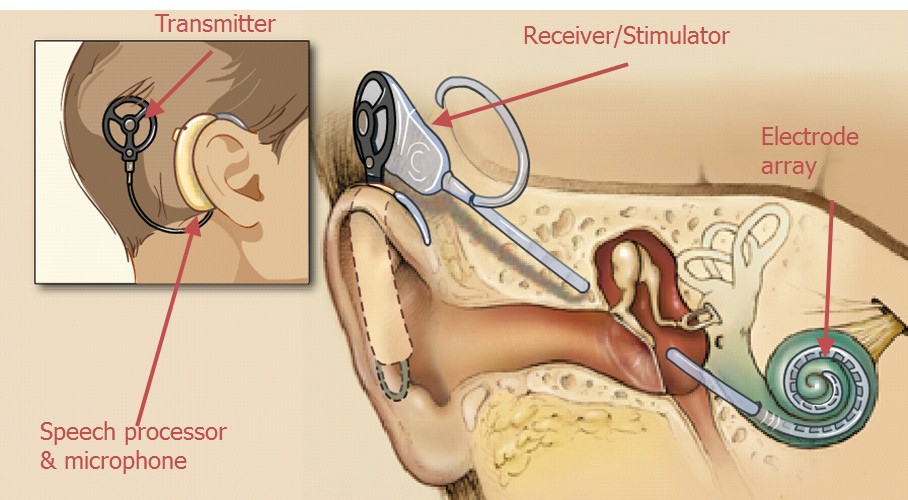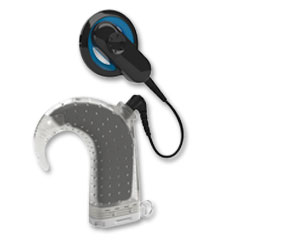Hearing impairment? Try cochlear implants
A hearing impairment can be A Good Thing
What is a cochlear implant and how does it work?
There are estimated to be over a quarter of a million people worldwide who have been fitted with a Cochlear implant and this number is growing all the time. It isn’t a miracle cure for deafness or hearing loss but the benefits that many people experience have greatly increased their quality of life.
So what is a cochlear implant?

A cochlear implant is a sophisticated electronic device that consists of two parts. There is the external part which contains the microphone and sound processor and an internal part that must be surgically implanted into the mastoid bone which is just behind the ear. Electrodes are inserted into the cochlea which receive the signals from the external processor.
What’s it for?
The name Cochlea comes from the Latin for ‘Snail Shell’, referring to its spiral structure. It is the auditory part of the inner ear and is divided into three separate chambers that process the different sound frequencies. Within these chambers is a fluid called Perilymph and tiny hairs called Cilia. When vibrations enter the cochlea it causes the fluid and hairs to move. When this happens, the brain will then interpret this movement as sound. For some people, this system doesn’t work often causing severe hearing impairment and even profound deafness.
How does it work?
This implant works by bypassing the parts of the ear that are not functioning correctly and directly stimulates the auditory nerve. The external microphone and processor picks up the sound and converts it to an electrical signal which is then sent to the implant under the skin. This is then transmitted down to the electrodes in the cochlea. Tiny electrical impulses then mimic the natural vibrations in the inner ear and send these signals to the brain as sound.
Who are these implants suitable for?
Cochlear implants are suitable for people who suffer with a severe or profound sensorineural hearing impairment and do not benefit from wearing a hearing aid. An in depth history of the person’s hearing loss will be taken as well as tests to determine the degree of loss and any possible medical causes. Other factors are also taken into account such as general health, state of mind and realistic expectations about what the results of the procedure are likely to be. As this procedure requires significant adjustment, the amount of family support available will also be looked at. These implants are often used for deaf children as they can help them learn language and speech and make school easier for them. For adults it can be a way of gaining more independence and confidence in their everyday lives.
What are the benefits?
Although the cochlear implant is not a cure for deafness or a hearing impairment, it can make a significant improvement for people who have had no success with other hearing solutions like hearing aids. Unlike a hearing aid, the implant does not make the sounds louder, it stimulates the auditory nerve directly delivering a better sense of sound. This means that someone with this implant can hear speech more clearly and will have a better awareness of the sounds in the environment around them.
Isn’t that major surgery though?
It is classed as major surgery but as it does not include any vital organs, it is not considered a high risk procedure, but like any surgery, there is always a certain degree of risk involved. The operation will last anywhere from 3 to 5 hours and a small portion of the hair must be shaved just behind the ear. The surgeon then attaches the implant to the mastoid bone and creates a pathway directly to the middle ear so the electrodes can be inserted into the Cochlea. You would normally spend 1 or 2 nights in hospital after the surgery before going home. Most over the counter pain relief such as paracetamol or ibuprofen should be adequate to deal with any discomfort and the stitches will dissolve after a few weeks. You will be advised not to wash your hair for at least a couple of weeks following the surgery. After 4 to 6 weeks you are required to make a return visit so the device can be activated and programmed. You will also be required to return for a number of tuning sessions to ensure you are getting the best sound quality possible from your implant.
Are there any side effects or restrictions after the surgery?
Any side effects are usually temporary but can include dizziness, numbness around the area of the operation, altered taste or tinnitus.
In regards to lifestyle changes, you can mostly carry on as normal but will be advised to avoid any sports that carry a risk of head injury or deep underwater activities such as scuba diving due to the pressure.
Due to the intensive screening process that each potential patient has to go through, this procedure has an extremely high success rate, exhibiting excellent results in a high percentage of users. Although the implant can give a better quality of hearing, things will never sound the same as they would with a normal functioning ear. Many people will find that they need to see a specialist to help adjust to the changes and get used to the difference in sound. Overall though, these Cochlear implants are providing a new lease of life for many who have previously felt isolated from the rest of the hearing world.
Author bio:
Paul Harrison is the Director of hearing aid specialists, Your Hearing. He has provided many resourceful articles over the last few months, he has covered topics including ways to naturally improve a hearing impairment, the different types of hearing aids and the benefits of using a hearing aid. Your Hearing helps people who have lost their hearing improve it and enhance their lifestyles.









Leave a Reply
Want to join the discussion?Feel free to contribute!